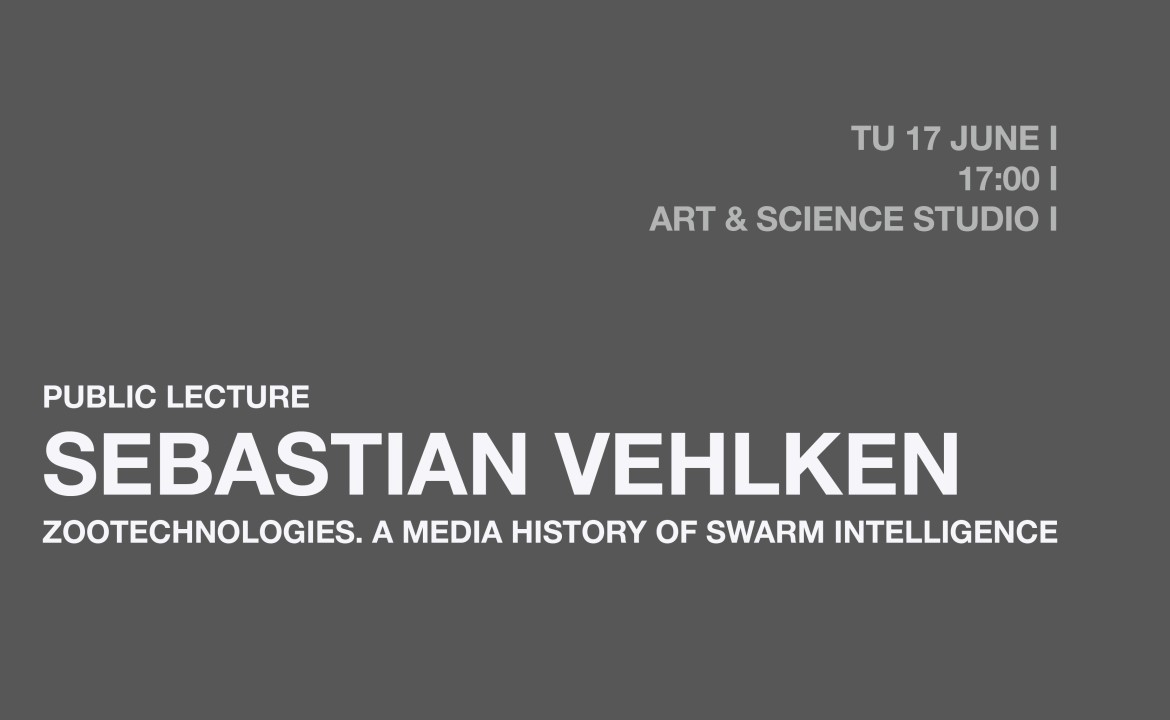
Zootechnologies. A Media History of Swarm Intelligence.
Lecture by Sebastian Vehlken
The presentation examines the media history of swarm research and the significance of swarming techniques to current socio-technological
processes. It explores how the procedures of swarm intelligence should be understood in relation to the concept of cultural
techniques. This brings the concept into proximity with recent debates in posthuman (media) theory, animal studies and software
studies. Swarms are conceptualised as zootechnologies that resist methods of analytical investigation. Synthetic swarms first
emerged as operational collective structures by means of the reciprocal computerisation of biology and biologisation of computer
science. In a cursive loop, swarms inspired agent-based modelling, which in turn provided biological researchers with enduring
knowledge about dynamic collectives. This conglomerate led to the development of advanced, software-based ‘particle systems’.
Swarm intelligence has become a fundamental cultural technique related to dynamic processes and an effective metaphor for
the collaborative efforts of society.
Since April 2013, Dr. Sebastian Vehlken is Junior Director of the Institute for Advanced Studies in Media Cultures of Computer Simulation (mecs), Leuphana University Lüneburg, and currently a Research Fellow of the IFK Vienna. He studied Media Studies and Economics at Ruhr-University Bochum and at Edith Cowan University, Perth. From 2005-2007, he was a DFG scholarship holder in the Graduate School »Media of History – History of Media« at Bauhaus-Universität Weimar, and from 2007-2010 Research Associate (PreDoc) in Media Philosophy, University of Vienna. In 2010, he finished his Ph.D. thesis on a media history of biological and computational swarm research at the Institute for Culture of the Humboldt University Berlin. From 2010-2013, he was a Research Associate (PostDoc) at the Institute for Culture and Aesthetics of Digital Media, Leuphana University Lüneburg. His current research project explores the media history of computer simulations in the context of civil nuclear energy technology in West Germany (FRG), with a focus on the development of fast breeder programs. Its preliminary title is Plutonium Worlds. Computer Simulation and Nuclear Energy 1950-1980.
Sebastian’s main research interests focus on media theory, Cultural Techniques, the media history of computer simulation and supercomputing, scientific visualization, the history and epistemology of think tanks, and oceans as media environments.
Since April 2013, Dr. Sebastian Vehlken is Junior Director of the Institute for Advanced Studies in Media Cultures of Computer Simulation (mecs), Leuphana University Lüneburg, and currently a Research Fellow of the IFK Vienna. He studied Media Studies and Economics at Ruhr-University Bochum and at Edith Cowan University, Perth. From 2005-2007, he was a DFG scholarship holder in the Graduate School »Media of History – History of Media« at Bauhaus-Universität Weimar, and from 2007-2010 Research Associate (PreDoc) in Media Philosophy, University of Vienna. In 2010, he finished his Ph.D. thesis on a media history of biological and computational swarm research at the Institute for Culture of the Humboldt University Berlin. From 2010-2013, he was a Research Associate (PostDoc) at the Institute for Culture and Aesthetics of Digital Media, Leuphana University Lüneburg. His current research project explores the media history of computer simulations in the context of civil nuclear energy technology in West Germany (FRG), with a focus on the development of fast breeder programs. Its preliminary title is Plutonium Worlds. Computer Simulation and Nuclear Energy 1950-1980.
Sebastian’s main research interests focus on media theory, Cultural Techniques, the media history of computer simulation and supercomputing, scientific visualization, the history and epistemology of think tanks, and oceans as media environments.
Zootechnologies. A Media History of Swarm Intelligence.
June 17, 2014, 17:00h
